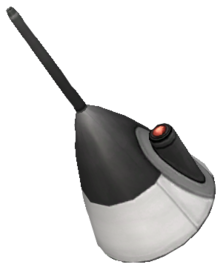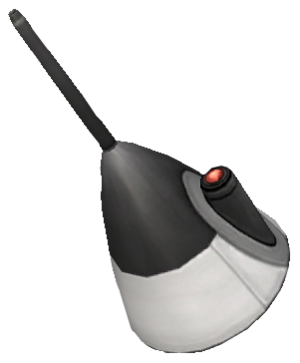Difference between revisions of "CH-J3 Fly-By-Wire Avionics Hub"
(Rewrote the description to fit the current function) |
m (Link to box) |
||
| (32 intermediate revisions by 17 users not shown) | |||
| Line 1: | Line 1: | ||
| − | + | {{:CH-J3 Fly-By-Wire Avionics Hub/Box}} | |
| − | {{:Avionics | ||
| − | The | + | The '''CH-J3 Fly-By-Wire Avionics Hub''' is a standalone SAS module. Visibly designed for the nosecone of aircraft, it functions equally well in the vacuum of space. |
| − | == | + | == Usage == |
| − | {{Quote|The latest in research and developement enabled the development of this little marvel, The Sensor Array Computing Nose Cone. It is outfitted with many "quality" sensors and a computer salvaged from the highest quality aircraft scrap, enabling it to collect atmospheric data while in flight.| | + | Simply attach the CH-J3 and it adds automated stability capabilities to [[craft]] otherwise lacking SAS functions. This may be useful if the craft is [[crew]]ed only with [[kerbonaut]]s lacking the “Pilot” [[specialization]], or controled by [[Probe|probes]] lacking advanced SAS capabilites, such as Probodyne [[OKTO]] and [[Stayputnik]]. This can be especially usefull in early career game, as it unlocked earlier that other probes with simmilar SAS capabilities. Howewer, it is worth noting that the CH-J3 Fly-By-Wire Avionics Hub is quite expensive and uses a large amount of electric charge (1,8 EC/s), but only if the SAS is turned on. |
| + | |||
| + | As it is stated in product discription, the CH-J3 Fly-By-Wire Avionics Hub can not operate autonomously - in order to function, another probe or command pod containing at least one kerbal must be attached to the craft. | ||
| + | |||
| + | == Product description == | ||
| + | |||
| + | {{Quote|Have you ever wanted to impress your peers by showing off your elite flying skills, but lacked the skills to become a trained pilot? C7 Aerospace's Fly-By-Wire Avionics Hub is the solution! This module allows even the most minimally trained crew to fly like an Ace! WARNING: This module cannot operate autonomously. Warranty void if attempting to do so. WARNING: Module contains no internal gyroscopes or control systems (control actuators sold separately). WARNING: Warranty void without proper use of C7 Aerospace Brand Sickness Bags (sold separately, currently out of stock).|1.0}} | ||
| + | |||
| + | In its previous incarnation as a science sensor the description was: | ||
| + | {{Quote|The latest in research and developement enabled the development of this little marvel, The Sensor Array Computing Nose Cone. It is outfitted with many "quality" sensors and a computer salvaged from the highest quality aircraft scrap, enabling it to collect atmospheric data while in flight.|0.22}} | ||
| + | |||
| + | In its even older incarnation as an SAS module, it was called the avionics package, and the description was: | ||
| + | {{Quote| The avionics package! It is outfitted with many "quality" sensors and a computer salvaged from the highest quality aircraft scrap.|0.15}} | ||
| − | == | + | == Trivia == |
| − | + | Originally the CH-J3 was called the '''Avionics package.''' and served as a toggleable module that provided [[SAS]] functionality. This kept [[plane]]s from spinning out of control. | |
| + | In {{version|0.22}}, the workings of SAS (and “ASAS”) were changed and came to be built into each [[command module]]s. This made standalone SAS modules superfluous, and the part was repurposed as as a sensor for gathering [[science]], and renamed The Sensor Array Computing Nose Cone. | ||
| − | + | In {{version|1.0}}, the [[Atmospheric Fluid Spectro-Variometer]] was added to handle atmosphere analysis, and the addition of kerbonaut specializations made not every kerbal semi-capable of piloting. So it was restored to its original role as a SAS module and renamed. | |
| − | |||
== Changes == | == Changes == | ||
| − | ; | + | [[File:AvionicsPackage v2.png|thumb|Current model of the CH-J3 part]] |
| − | * Re- | + | ;[[1.0]] |
| − | ; | + | * Re-repurposed; is once again a standalone SAS module |
| + | *New model | ||
| + | ;[[0.22]] | ||
| + | * Repurposed as an atmospheric sensor, renamed | ||
| + | ;[[0.18]] | ||
* (Undocumented) Mass reduced from 0.8 to 0.08 | * (Undocumented) Mass reduced from 0.8 to 0.08 | ||
| − | ; | + | ;[[0.15]] |
| − | * Initial | + | * Initial release |
| + | * Functions as standalone SAS module | ||
| + | |||
{{Parts}} | {{Parts}} | ||
| + | [[Category: Reaction wheels]] | ||
Latest revision as of 17:10, 10 October 2024
| CH-J3 Fly-By-Wire Avionics Hub | ||
| Stability Augmentation System by C7 Aerospace Division | ||
| Radial size | Tiny | |
| Cost | (total) | 5 200.00 |
| Mass | (total) | 0.080 t |
| Drag | 0.2 | |
| Max. Temp. | 2400 K | |
| Impact Tolerance | 7 m/s | |
| Research | | |
| Unlock cost | 10 500 | |
| Since version | 0.15 | |
| Part configuration | avionicsNoseCone.cfg | |
| SAS level | 3 | |
| Field of View | (min) | 10 ° |
| (max) | 20 ° | |
| Anomaly detection | 24 % | |
| Enhanceable | Yes | |
| Mode | Terrain | |
| Packed volume | 350 l | |
The CH-J3 Fly-By-Wire Avionics Hub is a standalone SAS module. Visibly designed for the nosecone of aircraft, it functions equally well in the vacuum of space.
Contents
Usage
Simply attach the CH-J3 and it adds automated stability capabilities to craft otherwise lacking SAS functions. This may be useful if the craft is crewed only with kerbonauts lacking the “Pilot” specialization, or controled by probes lacking advanced SAS capabilites, such as Probodyne OKTO and Stayputnik. This can be especially usefull in early career game, as it unlocked earlier that other probes with simmilar SAS capabilities. Howewer, it is worth noting that the CH-J3 Fly-By-Wire Avionics Hub is quite expensive and uses a large amount of electric charge (1,8 EC/s), but only if the SAS is turned on.
As it is stated in product discription, the CH-J3 Fly-By-Wire Avionics Hub can not operate autonomously - in order to function, another probe or command pod containing at least one kerbal must be attached to the craft.
Product description
| “ | Have you ever wanted to impress your peers by showing off your elite flying skills, but lacked the skills to become a trained pilot? C7 Aerospace's Fly-By-Wire Avionics Hub is the solution! This module allows even the most minimally trained crew to fly like an Ace! WARNING: This module cannot operate autonomously. Warranty void if attempting to do so. WARNING: Module contains no internal gyroscopes or control systems (control actuators sold separately). WARNING: Warranty void without proper use of C7 Aerospace Brand Sickness Bags (sold separately, currently out of stock). — 1.0 |
” |
In its previous incarnation as a science sensor the description was:
| “ | The latest in research and developement enabled the development of this little marvel, The Sensor Array Computing Nose Cone. It is outfitted with many "quality" sensors and a computer salvaged from the highest quality aircraft scrap, enabling it to collect atmospheric data while in flight. — 0.22 |
” |
In its even older incarnation as an SAS module, it was called the avionics package, and the description was:
| “ | The avionics package! It is outfitted with many "quality" sensors and a computer salvaged from the highest quality aircraft scrap. — 0.15 |
” |
Trivia
Originally the CH-J3 was called the Avionics package. and served as a toggleable module that provided SAS functionality. This kept planes from spinning out of control.
In version 0.22, the workings of SAS (and “ASAS”) were changed and came to be built into each command modules. This made standalone SAS modules superfluous, and the part was repurposed as as a sensor for gathering science, and renamed The Sensor Array Computing Nose Cone.
In version 1.0, the Atmospheric Fluid Spectro-Variometer was added to handle atmosphere analysis, and the addition of kerbonaut specializations made not every kerbal semi-capable of piloting. So it was restored to its original role as a SAS module and renamed.
Changes
- Re-repurposed; is once again a standalone SAS module
- New model
- Repurposed as an atmospheric sensor, renamed
- (Undocumented) Mass reduced from 0.8 to 0.08
- Initial release
- Functions as standalone SAS module

